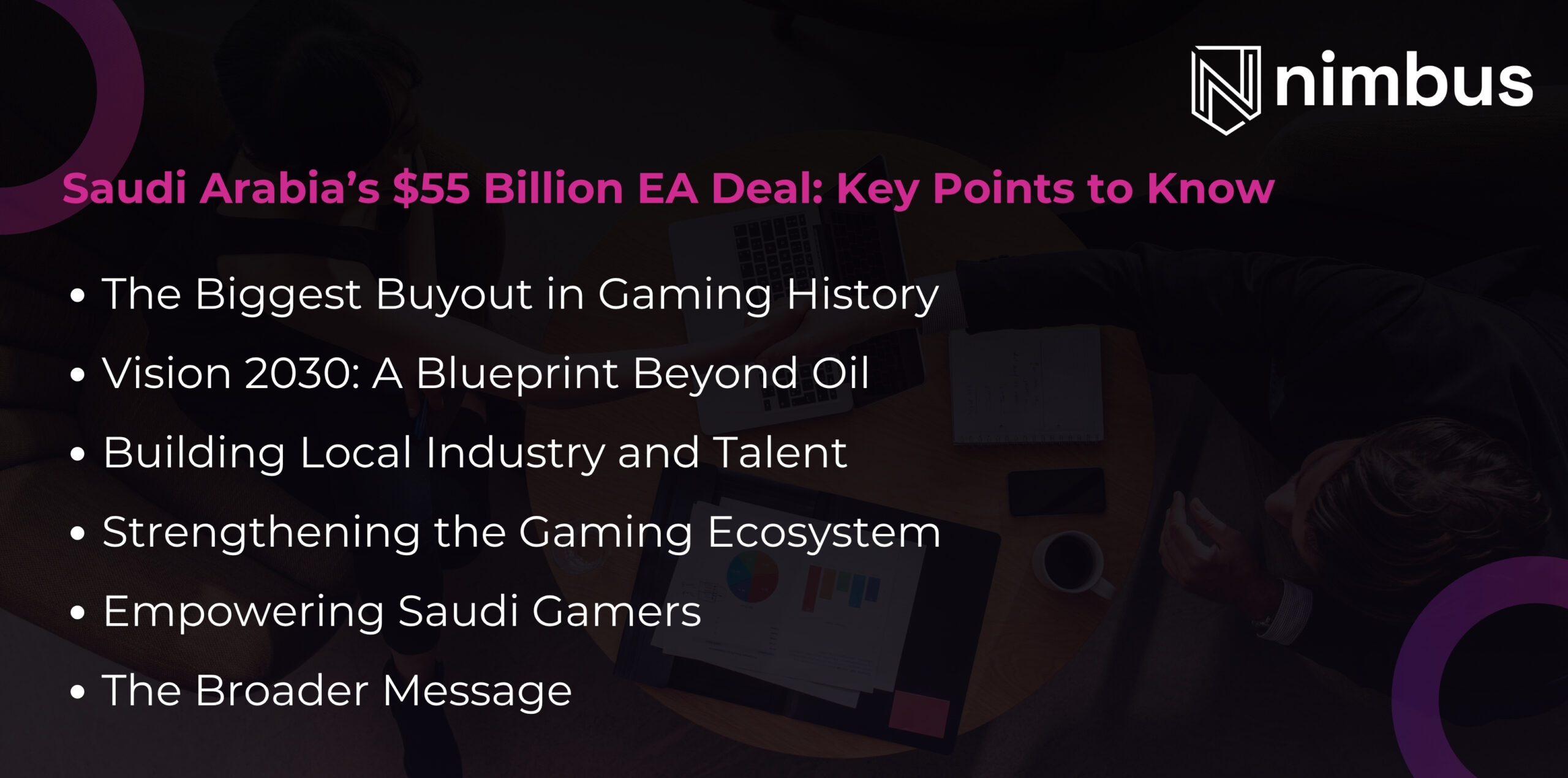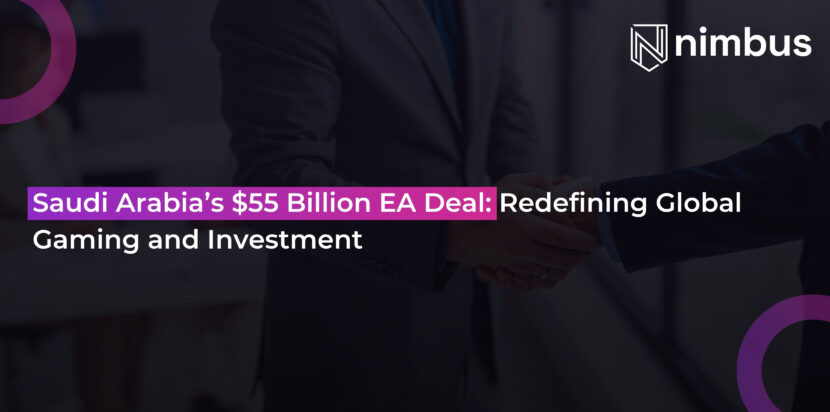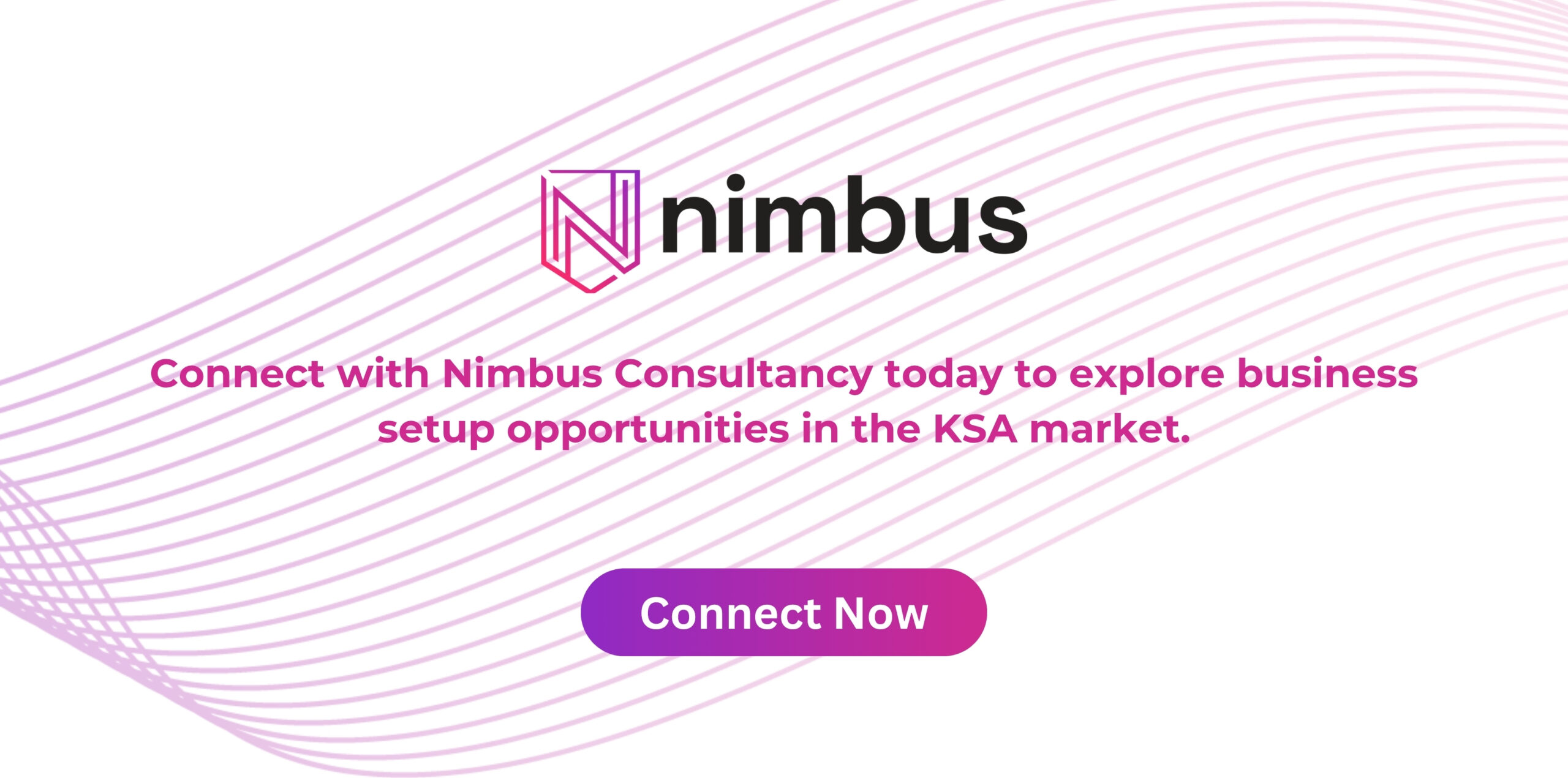The global video game industry, valued at nearly $190 billion with 3.6 billion players worldwide, is witnessing a new kind of disruption and it’s coming from Saudi Arabia.
Once seen mainly as a consumer market, the KSA is now positioning itself as a creator, investor, and global influencer in gaming. With over two-thirds of its population actively playing games, Saudi Arabia is already one of the largest gaming markets in the Middle East.
Local spending on games exceeds $1.2 billion annually, and the sector is expanding at about 8 percent per year. This growth is powered by Vision 2030, which aims to attract foreign investment and build future-ready industries such as gaming, entertainment, and technology.
In late September 2025, that vision took a historic leap when Electronic Arts (EA), one of the world’s biggest game publishers, agreed to be acquired by a Saudi-led consortium in a $55 billion deal. This post breaks down how this decision can redefine growth and business setup in Saudi Arabia.
Saudi Arabia’s $55 Billion EA Deal: Key Points to Know

1. The Biggest Buyout in Gaming History
The acquisition, led by Saudi Arabia’s Public Investment Fund (PIF) alongside Silver Lake and Affinity Partners, is the largest leveraged buyout ever in entertainment and the second biggest in gaming after Microsoft’s 2022 acquisition of Activision Blizzard for $68.7 billion.
The consortium will pay $210 per share, a 25 percent premium, with around $36 billion in equity (including PIF’s existing holdings) and about $19–20 billion in financing arranged by JPMorgan.
EA’s headquarters, however, will remain in California under CEO Andrew Wilson, ensuring continuity and operational stability. Analysts describe the move as a defining moment for the global gaming industry.
2. Vision 2030: A Blueprint Beyond Oil
For Saudi Arabia, the acquisition reflects a national statement of intent. It embodies Vision 2030’s drive to diversify the economy and reduce dependence on hydrocarbons by developing sectors like technology, sports, and digital entertainment.
Gaming sits precisely at this intersection. It’s youth-driven, innovation-heavy, and global in scope. By acquiring a global leader like EA, Saudi Arabia positions itself as an active creator in an industry that resonates deeply with its young population.
This is also the culmination of years of strategic investment. Through PIF and its subsidiary, Savvy Games Group, the Kingdom has been steadily building its footprint in global gaming, taking stakes in companies such as Nintendo, Capcom, and Take-Two Interactive, and previously owning nearly 10 percent of EA.
In 2022, Savvy Games Group announced a $37.8 billion plan to transform Saudi Arabia into a global hub for gaming and e-sports by 2030. The EA acquisition now represents the centerpiece of that strategy.
3. Building Local Industry and Talent
The deal’s impact extends far beyond financial markets. One of Vision 2030’s key goals is to cultivate homegrown expertise and create new employment opportunities for Saudi citizens.
The Savvy Games Group initiative aims to incubate 250 gaming startups, boost investment through company formation in the KSA, and create nearly 39,000 jobs by 2030.
EA’s involvement could accelerate this ambition dramatically. The company’s global network of studios offers opportunities for internships, skill exchange, and technology transfer. Moreover, EA’s vast experience in publishing and production can guide emerging Saudi developers to build their own global-quality games.
4. Strengthening the Gaming Ecosystem
Saudi Arabia has already demonstrated its ability to host world-class e-sports tournaments and gaming conventions. With EA now under its investment umbrella, these efforts could expand further.
Future tournaments might feature EA’s flagship franchises like EA Sports FC or Battlefield, bringing international players, teams, and fans to Saudi soil. This growing event infrastructure complements the broader investment landscape that supports foreign investors.
The country’s progress in simplifying the business setup process in Saudi Arabia makes it easier for gaming and tech companies to establish operations locally. Government support, available capital, and a youthful talent pool provides fertile ground for new ventures in the gaming sector.
Furthermore, local and international firms can also rely on Saudi business setup services to navigate compliance, Saudization policies, and licensing efficiently.
5. Empowering Saudi Gamers
Beyond economic transformation, this acquisition directly benefits Saudi gamers. The Kingdom’s large and enthusiastic gaming community has long faced challenges like high latency due to limited local server infrastructure.
With EA’s new ownership ties, there’s a strong likelihood of expanding regional servers for popular online titles, ensuring smoother, more competitive experiences for players across the Gulf.
6. The Broader Message
The EA deal sends a clear message: Saudi Arabia is no longer content to be a passive participant in global entertainment. It is actively shaping the future of digital industries by combining strategic capital, local passion, and long-term planning.
This transformation parallels the country’s ongoing modernization in business and investment. Just as reforms have made business setup in Saudi Arabia simpler and more transparent, strategic acquisitions like EA demonstrate the Kingdom’s ability to compete and collaborate at the highest international levels.
The Bottom Line
The $55 billion acquisition of Electronic Arts marks a turning point for the KSA. This move merges creativity with capital, youth enthusiasm with national ambition, and global scale with local opportunity.
For EA, this new chapter provides the freedom and financial backing to pursue innovation. For Saudi Arabia, it represents tangible progress toward Vision 2030: an economy defined by what it builds, creates, and shares with the world.



